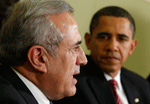WASHINGTON — U.S. President Barack Obama this week asked Lebanese President Michel Sleiman in White House talks to take action against arms smuggling into Lebanon which he said threatened Israeli security.

|
|
U.S. President Barack Obama (R) meets with his Lebanese counterpart Michel Suleiman in the Oval Office at the White House in Washington December 14, 2009. REUTERS/Jim Young |
“I want to be clear, I emphasized to him our concerns about the extensive arms that are smuggled into Lebanon that potentially serve as a threat to Israel.
“President Sleiman and I are not going to agree on every issue with respect to… Israel, Lebanon, the Palestinians and Syria.”
“What we do agree on is we can resolve these issues through dialogue and negotiations, rather than through violence.”
Sleiman said he had brought up Israel with Obama.
“We also discussed the Israeli threats against Lebanon which are taking place and place obstacles to the economic growth of the country,” Sleiman said.
“We asked President Obama and the U.S. to exert further pressure on Israel to implement Resolution 1701.”
Israeli Prime Minister Benjamin Netanyahu last week denounced the resolution, saying it had proven to be a failure, despite ending the war between Israel and the Shi’a Hizbullah militia.
In November, Israel intercepted a ship that it said was carrying hundreds of tons of weapons from Iran destined for Hizbullah.
Obama told reporters that Lebanon was a “critical country, in a critical region,” and praised Sleiman for managing the swift-moving political currents threatening stability in his country.
“We want to do everything we can to encourage a strong, independent and democratic Lebanon,” Obama said, noting that Washington was especially keen to strengthen Lebanese armed forces.
Sleiman praised Obama’s landmark speech to the Muslim world in Cairo in June and the award of the Nobel Peace Prize to the U.S. leader last week.
He also called on the United States to push for the resumption of the stalled Middle East peace process, which has so far defied Obama’s attempts to forge sweeping progress.
Resolution 1701 ended the Israeli-Hizbullah war, which killed more than 1,200 Lebanese, mostly civilians, and more than 160 Israelis, mostly soldiers, but it has not led to a permanent ceasefire.
It bans supplying arms to Lebanese militias while affirming the Beirut government’s sovereignty over the entire country.
Israel says Hizbullah has tightened its military hold on southern Lebanon since the conflict, despite a reinforced UN peacekeeping force, and equipped itself with tens of thousands of rockets, smuggled mainly from Syria.
Sleiman, who earlier met House of Representatives speaker Nancy Pelosi, also held in-depth talks with Vice President Joe Biden and met with U.S. Special Envoy to the Middle East George Mitchell, who briefed him on his mission to revive peace negotiations in the Middle East. Mitchell “assured President Sleiman that no solution will be at the expense of Lebanon’s security, sovereignty and stability,” a statement by the Sleiman’s office said.
Sleiman also met with U.S. National Security Adviser General James Jones, Lebanese Ambassador in Washington Antoine Chedid and employees at the Lebanese Embassy in Washington, the statement said.
Biden “stressed that our efforts to achieve our goals in the Middle East will not come at Lebanon’s expense,” the statement. said
Sleiman also met with ambassadors to the U.S. from other Arab countries while in the nation’s capitol.






Leave a Reply